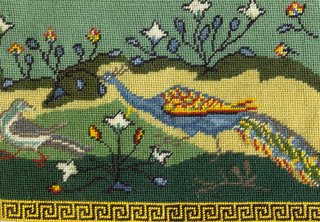2-12-06 * Sixth Sunday After the Epiphany, Year B
Collect
O God, the strength of all those who put their trust in thee:
Mercifully accept our prayers; and because, through the
weakness of our mortal nature, we can do no good thing
without thee, grant us the help of thy grace, that in keeping
thy commandments we may please thee both in will and deed;
through Jesus Christ our Lord, who liveth and reigneth with
thee and the Holy Spirit, one God, for ever and ever. Amen.
Preface of the Epiphany
Because in the mystery of the Word made flesh, thou hast
caused a new light to shine in our hearts, to give the knowledge
of thy glory in the face of thy Son Jesus Christ our Lord.
Lections:
Psalm 42:1-7 (Quemadmodum)
As the deer longs for the water-brooks,* so longs my soul for you, O God.
OT: 2 Kings 5:1-15b (Elisha cures Naaman, commander of the army of the king of Syria, of leprosy.)
Epistle: 1 Corinthians 9:24-27 (...in a race all the runners compete, but only one receives the prize...)
Gospel: Mark 1:40-45 (Jesus cures a leper.)
The Homily: The Olympics, The Race, and The Prize
It's hard, with the Winter Olympics going on in Turin, not to pick up on the theme St. Paul adopts in today's epistle lesson from First Corinthians: "...in a race all the runners compete, but only one receives the prize." Paul makes the point that an athlete has to exercise great self-control in all things in order to be a winner--and he goes on to say that all this self-control produces in the long run (excuse the pun) only a perishable wreath. In other words, the end result of all the work and sacrifice that goes into winning a race ends up years later as a dusty trophy on the mantle or on a shelf--evidence of former glory, bragging rights for a has-been; a pitiable statement at the end of life that says: "I was somebody great.....once upon a time."
The idea an athletic contest serving as a metaphor for human life is a useful one and comparing it to the Olympics is also helpful. True, athletics is not everyone's cup of tea, but few have not competed in some type of competition, so the metaphor resounds in each of us on the level of personal experience. It's useful to look closely at what we can learn from Paul's Olympic metaphor.
The context of Paul's metaphor is the Olympics: the ancient Olympic contests were religious. The races, the fights, indeed every competition was presented as a tribute to the gods--Mt. Olympus, remember, was the home of the ancient Greek gods and winning a laurel wreath there--though perishable--attributed to the winner something of the divine; the winning athletes were raised to the status of demi-gods and they were celebrated as such in their home towns; not much different from the way we celebrate NFL stars, soccer players, and--yes--even rock stars. But who is less honored that yesterday's stars? Dusty trophies. "Has-beens" and "once weres." Maybe the ancient Greeks were less fickle than we are, but I doubt it. Human nature is always looking for the "next new thing."
Paul takes this facination with the winners of earthly races--especially those dedicated to honoring the Olympian gods--and compares their transient glory with the ultimate victory each of us strives for as we work to glorify the one, true God in our life-races. The first is doomed to wither while the latter "fadeth not away."
Both, as Paul reminds us, require "great self-control in all things" in order to be a winner. And both require a particular attitude toward the contest; the expectation of winning. Who enters a competition he does not expect to win? Or stated in another way, does anyone ever win a competition he expects to lose? Unless one expects ultimate victory, there is no incentive to exercise all that self-control. Unless the reward is as great as the sacrifice, why bother? Perhaps someone might chose to enter a competition for a reason other than winning--but the effort would have to be half-hearted. Certainly it would not be worth the effort Paul implies when he talks of "great self-control," the discipline necessary to be triumphant.
At some point, metaphors--no matter how apt--are bound to fail. In this case, the race we run in life is different for some important reasons.
*In the Olympics, ancient or modern, only one person can win the laurel crown--every one else is an "also ran." In life's race, every one who starts can win. The competition is oneself; that's what makes self-control the key.
*Making a mistake in the Olympics--even a small one--usually means losing. In life, God allows mistakes if we acknowledge them and work at overcoming them. (There's that self-control thing again.)
*In the Olympics, one can chose not to compete--especially if there's no chance of winning. In life, you don't get a choice. You're in the competition whether or not you want to be. But you can win in life--everyone can win. But it requires the same dedication to winning as does an Olympic victory. Self-control, anyone?
*Olympic victory--no matter how great and celebrated--ends up as part of the dead past. Victory in life however brings an eternal crown that never dies. But the price is very much the same: hard work, dedication to winning, and the confidence that, with God's help, victory is not only possible, but assured.
Hymnal 1982, #546
Awake, my soul, stretch every nerve, and press with vigor on;
a heavenly race demands thy zeal, and an immmortal crown.
--and an immortal crown.
A cloud of witnesses around hold thee in full survey;
forget the steps already trod, and onward urge thy way.
--and onward urge thy way.
'Tis God's all animating voice that calls thee from on high;
'tis his own hand presents the prize to thine aspiring eye.
--to thine aspiring eye.
Then wake, my soul, stretch every nerve, and press with vigor on;
a heavenly race demands thy zeal, and an immortal crown.
--and an immortal crown.
O God, the strength of all those who put their trust in thee:
Mercifully accept our prayers; and because, through the
weakness of our mortal nature, we can do no good thing
without thee, grant us the help of thy grace, that in keeping
thy commandments we may please thee both in will and deed;
through Jesus Christ our Lord, who liveth and reigneth with
thee and the Holy Spirit, one God, for ever and ever. Amen.
Preface of the Epiphany
Because in the mystery of the Word made flesh, thou hast
caused a new light to shine in our hearts, to give the knowledge
of thy glory in the face of thy Son Jesus Christ our Lord.
Lections:
Psalm 42:1-7 (Quemadmodum)
As the deer longs for the water-brooks,* so longs my soul for you, O God.
OT: 2 Kings 5:1-15b (Elisha cures Naaman, commander of the army of the king of Syria, of leprosy.)
Epistle: 1 Corinthians 9:24-27 (...in a race all the runners compete, but only one receives the prize...)
Gospel: Mark 1:40-45 (Jesus cures a leper.)
The Homily: The Olympics, The Race, and The Prize
It's hard, with the Winter Olympics going on in Turin, not to pick up on the theme St. Paul adopts in today's epistle lesson from First Corinthians: "...in a race all the runners compete, but only one receives the prize." Paul makes the point that an athlete has to exercise great self-control in all things in order to be a winner--and he goes on to say that all this self-control produces in the long run (excuse the pun) only a perishable wreath. In other words, the end result of all the work and sacrifice that goes into winning a race ends up years later as a dusty trophy on the mantle or on a shelf--evidence of former glory, bragging rights for a has-been; a pitiable statement at the end of life that says: "I was somebody great.....once upon a time."
The idea an athletic contest serving as a metaphor for human life is a useful one and comparing it to the Olympics is also helpful. True, athletics is not everyone's cup of tea, but few have not competed in some type of competition, so the metaphor resounds in each of us on the level of personal experience. It's useful to look closely at what we can learn from Paul's Olympic metaphor.
The context of Paul's metaphor is the Olympics: the ancient Olympic contests were religious. The races, the fights, indeed every competition was presented as a tribute to the gods--Mt. Olympus, remember, was the home of the ancient Greek gods and winning a laurel wreath there--though perishable--attributed to the winner something of the divine; the winning athletes were raised to the status of demi-gods and they were celebrated as such in their home towns; not much different from the way we celebrate NFL stars, soccer players, and--yes--even rock stars. But who is less honored that yesterday's stars? Dusty trophies. "Has-beens" and "once weres." Maybe the ancient Greeks were less fickle than we are, but I doubt it. Human nature is always looking for the "next new thing."
Paul takes this facination with the winners of earthly races--especially those dedicated to honoring the Olympian gods--and compares their transient glory with the ultimate victory each of us strives for as we work to glorify the one, true God in our life-races. The first is doomed to wither while the latter "fadeth not away."
Both, as Paul reminds us, require "great self-control in all things" in order to be a winner. And both require a particular attitude toward the contest; the expectation of winning. Who enters a competition he does not expect to win? Or stated in another way, does anyone ever win a competition he expects to lose? Unless one expects ultimate victory, there is no incentive to exercise all that self-control. Unless the reward is as great as the sacrifice, why bother? Perhaps someone might chose to enter a competition for a reason other than winning--but the effort would have to be half-hearted. Certainly it would not be worth the effort Paul implies when he talks of "great self-control," the discipline necessary to be triumphant.
At some point, metaphors--no matter how apt--are bound to fail. In this case, the race we run in life is different for some important reasons.
*In the Olympics, ancient or modern, only one person can win the laurel crown--every one else is an "also ran." In life's race, every one who starts can win. The competition is oneself; that's what makes self-control the key.
*Making a mistake in the Olympics--even a small one--usually means losing. In life, God allows mistakes if we acknowledge them and work at overcoming them. (There's that self-control thing again.)
*In the Olympics, one can chose not to compete--especially if there's no chance of winning. In life, you don't get a choice. You're in the competition whether or not you want to be. But you can win in life--everyone can win. But it requires the same dedication to winning as does an Olympic victory. Self-control, anyone?
*Olympic victory--no matter how great and celebrated--ends up as part of the dead past. Victory in life however brings an eternal crown that never dies. But the price is very much the same: hard work, dedication to winning, and the confidence that, with God's help, victory is not only possible, but assured.
Hymnal 1982, #546
Awake, my soul, stretch every nerve, and press with vigor on;
a heavenly race demands thy zeal, and an immmortal crown.
--and an immortal crown.
A cloud of witnesses around hold thee in full survey;
forget the steps already trod, and onward urge thy way.
--and onward urge thy way.
'Tis God's all animating voice that calls thee from on high;
'tis his own hand presents the prize to thine aspiring eye.
--to thine aspiring eye.
Then wake, my soul, stretch every nerve, and press with vigor on;
a heavenly race demands thy zeal, and an immortal crown.
--and an immortal crown.







